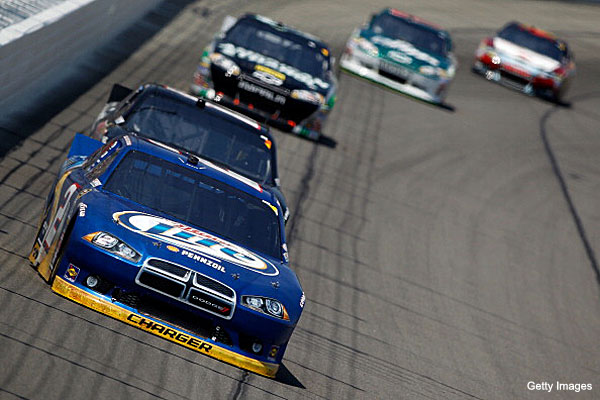
So that was, uh ... a good race?
The inaugural spring race in Kansas ended with a million fans' hearts in their throats, yes, but not because of a dead-bang hammer-down sprint to the checkers. No, this was a classic fuel-mileage race, one that Brad Keselowski won thanks to fuel conservation that would make the EPA proud. It came just hours after Justin Allgaier coasted to victory over a similarly bone-dry Carl Edwards in the Nationwide race.
Yes, it was thrilling. Yes, it was tense. But was it good? It depends, to paraphrase an old '90s chestnut, on what your definition of "good" is. It's a racing style defined by strategy rather than horsepower, mathematics rather than speed. In short, it's the racing equivalent of sabermetrics, the numbers-above-all discipline that's conquered much of baseball.
Fuel-mileage racing is the ultimate high-risk, high-reward gamble; you misplay it and you're almost certainly out of the top 10, at best. But managed properly, with a savvy crew chief and a slick-footed driver, fuel-mileage racing can help you capture a win where you otherwise would've finished deep in the pack. It's as legitimate as any other kind of win, certainly at least as much as a rain-shortened one, but there's still a stigma attached to fuel-mileage wins.
Part of the issue is that fuel-mileage racing is problematic from a rooting perspective. If you're not a fan of the guy leading the race, you're basically wishing ill to befall a driver, either hoping for the leaders to�run out of gas or wanting a caution flag to fly. Now, NASCAR fans have no trouble rooting for someone to fail, but there's still something less than satisfying about knowing that your guy won only because he didn't edge quite as far out on a skinny limb as everybody else.
Bottom line, though, there are no asterisks in the record books for fuel-mileage wins. They count just as much as the all-out full-throttle ones. And if you do loathe these kinds of races, sorry: you're about to see a full summer's worth of fuel gambling.
As long as the numbers work properly, driver after bubble driver will be taking chances and trying to win their way into the Chase via the wild card. If Keselowski can scrape and scramble his way into the top 20 (he's now just seven points out) he'll be tied with Jeff Gordon for the most wins among the outside-the-Chase set. In one race, with one fuel-mileage gamble, he's gone from afterthought to legit Chase contender.
Coming up, we've got several notorious fuel-mileage tracks: both Michigans, both Poconos, both road courses and Indy. So expect crew chiefs to bust out their calculators and begin the process of gauging just how far they can stretch a drop of gas. It may not be the most compelling racing, but then there's no rule that says you have to drive even 10 feet past the finish line. Extra fuel in your tank at the end of the race is like a jack-o-lantern on the first of November.
So, your take. Fuel-mileage races: thrilling racing or necessary evil?
Talisa Soto Julianne Hough Paula Garcés Genelle Frenoy Shania Twain
No comments:
Post a Comment